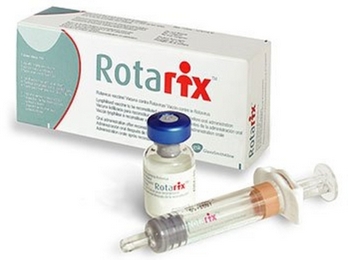A vaccine against rotavirus – Rotavirus vaccine
What is rotavirus?
Rotavirus is transmitted through stool. Also, it is easily spread by contaminated hands and objects. Symptoms usually appear within two days after infection and may include:
- Fever;
- Disorder stomach;
- Vomiting (can last 3-8 days);
- Diarrhea (can last 3-8 days);
- Loss of interest in eating;
- Dehydration.
According to research, almost all children can be infected with rotavirus before age five years. Right now, widespread use of the vaccine in the number of cases decreased significantly. Rotavirus rarely causes death in developed countries, but infection is fatal in many third world countries.
What is rotavirus vaccine?
Rotavirus vaccine is given by mouth. It contains a live virus vaccine, which allows to develop immunity to the disease.
Exist 2 brand rotavirus vaccine, RotaTeq and Rotarix.

Who and when to be vaccinated against rotavirus?
Depending on the type of vaccine, your child may need two or three doses. The recommended vaccination schedule:
- 2 of the month – The first dose of the vaccine;
- 4 of the month – a second dose of vaccine;
- 6 months – Third vaccination (if necessary).
Risks, associated with rotavirus vaccine
As with any vaccine, from rotavirus vaccine there is a small risk of serious complications, such as a severe allergic reaction.
Most children tolerate the vaccine without any problems. In a small number of cases, vaccination may be mild diarrhea and vomiting.
Also, it may be a very small risk of a serious bowel obstruction – invaginations.
Who should not be vaccinated against rotavirus?
Children must not be vaccinated, if they:
- There were life-threatening allergic reaction to a previous dose or any component of the vaccine;
- Moderately or severely ill (they can be vaccinated after recovery);
- Had blood transfusion;
- They have a weakened immune system (eg, patients with HIV infection or AIDS);
- Long time taking steroid medication;
- Cancer patients;
- Was intussusception, or intestinal pathology is present (increased risk of intussusception).
What are the ways to prevent rotavirus infection in addition to vaccination?
Important Wash hands and comply with hygiene rules. However, these steps are not able to completely prevent rotavirus infection.
What happens in the event of an outbreak of rotavirus infection?
In the event of an outbreak the health authorities check food and water sources, To make sure, that they are not contaminated.
To prevent the spread of the virus is recommended that frequent washing of hands and surfaces. Soiled linens and clothes should be handled by a special solution, carefully washed and dried.
Rotavirus vaccine is not used to vaccinate older children or adults.
